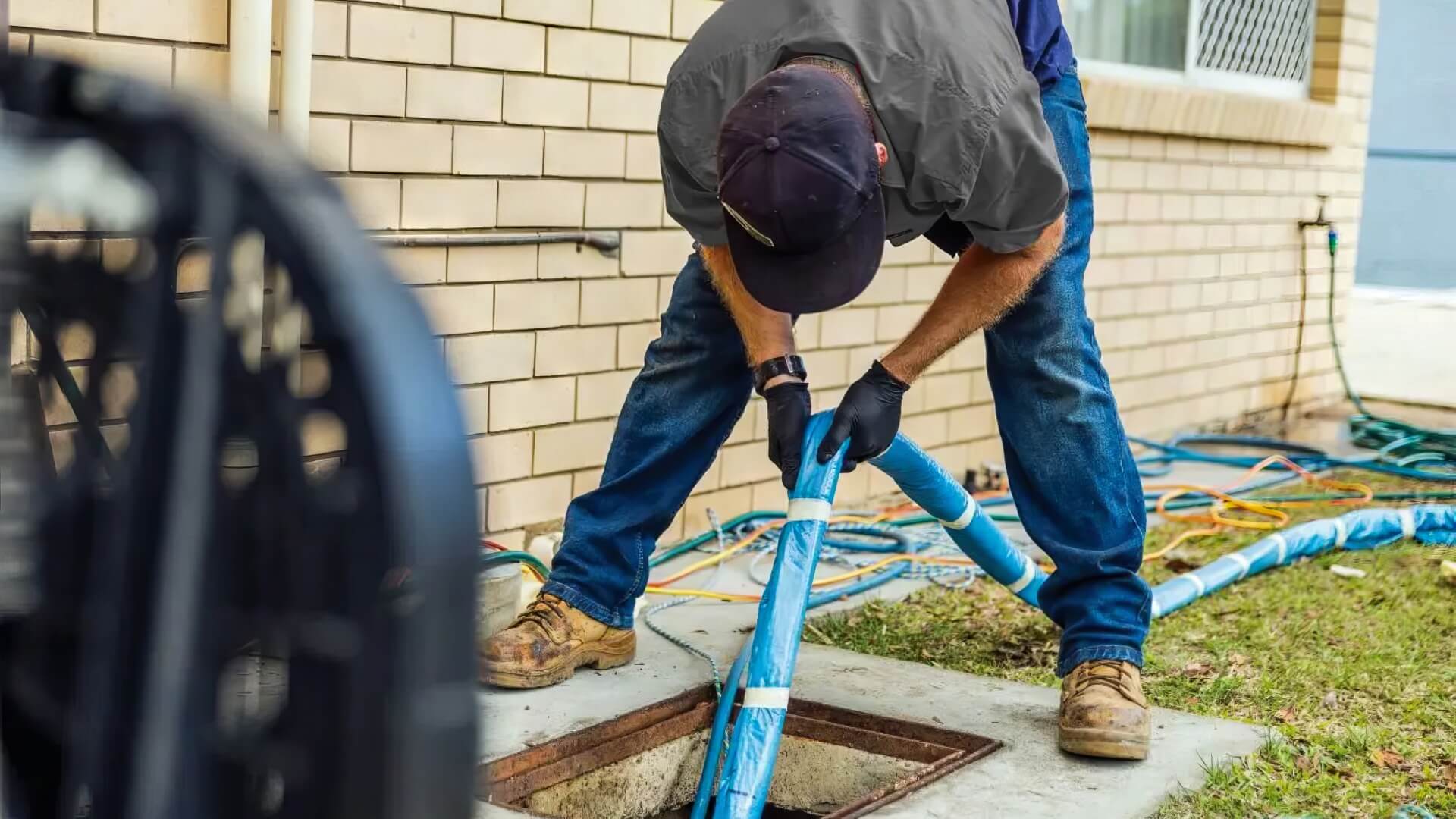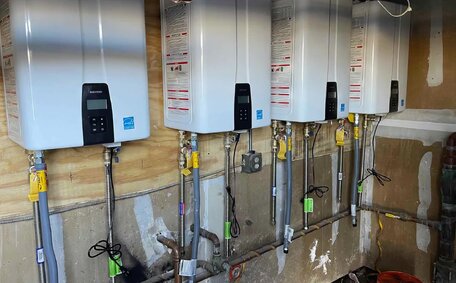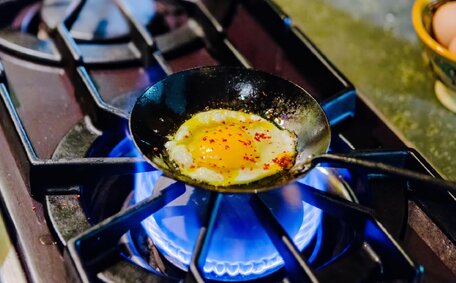How Water Pressure Impacts Hot Water Systems
Optimal water pressure is crucial for hot water heaters to function correctly. Adequate pressure, typically between 35-80 psi, allows water to circulate properly through the tank, pipes and out to fixtures. This ensures efficient heating and consistent hot water delivery.
As water is heated, it expands. Systems lacking expansion capability can suffer component damage from excessive water pressure. Conversely, levels below 20 psi can cause low hot water temperature due to inadequate submersion of heating elements, reducing efficiency.
Fluctuating pressure also affects the performance of water heaters, impacting both hot cold water delivery.
Partial valve closure, undersized pipes, or high usage can impede water flow. A shut off valve error may result in low hot water supply, or none at all. Maintaining consistent optimal pressure ensures system reliability and energy efficiency.
Recommended Water Pressure Levels
Keeping water pressure between 40-60 psi supports the optimal performance and durability of your hot water system. This moderate pressure range helps your tank and components work efficiently without excessive strain.
Insufficient pressure leading to a rise above 80 psi may result in water expansion damage to the tank, valves, and supply lines. Pressure below 20 psi can hinder proper submersion of heating elements, affecting heat transfer. Fluctuating water pressure can also disrupt your system’s balance.
A pressure regulator maintains steady water pressure, reducing the risk of low hot water problems. Regularly checking your house’s water pressure confirms that the valve operates effectively within the 40-60 psi range. If water pressure readings are too high or low, it’s advisable to contact a plumber.
Signs of Low Water Pressure
There are several clear signs indicating you may be experiencing your low hot water pressure in your system:
- Trickling in your shower - Low hot water pressure could be due to a weak stream of water.
- Bathtubs filling slowly - Filling a bathtub becomes time-consuming when low pressure hampers water heater performance.
- Intermittent water flow – Hot water may cease completely during peak usage periods.
- Rumbling water pipes - You may hear gurgling noises from trapped air pockets.
- Inadequate hot water coverage, with only one tap working at a time, can indicate low pressure issues.
- Fault code on system display - An error message may alert users to pressure loss.
Low pressure can disrupt hot and cold water flow, potentially reducing hot water availability throughout your plumbing system. Causes range from hard water sediment build-up to undersized supply pipes. Promptly consult a plumber if you detect signs of low water pressure, which may intensify over time.
Signs of High Water Pressure
There are several noticeable signs indicating you may have high water pressure in your hot water system:
- Tap fixtures dripping after shutoff
- Relief valve on system discharging water
- Reduced life your water-using appliances experience
- Difficulty adjusting water temperature at taps
Persistently high pressure above 80 PSI can cause considerable damage. Within a hot water system, the force of expansion can become pronounced. This can rupture supply lines, warp components such as the pressure relief valve, and reduce insulation effectiveness.
High water pressure, a cause of low hot water availability, also shortens the service life of appliances like washing machines and dishwashers. Control valves and solenoids are prone to quicker failure when under stress.
Identifying and resolving the root causes of high pressure protects your plumbing and appliances. Common remedies for high pressure include recalibrating pressure regulators, replacing worn washers, or enlarging home supply pipes.
Checking Your Home’s Water Pressure
Checking your home’s water pressure is easy with a water pressure gauge. Here is a guide to check your water pressure for both hot and cold water:
- Obtain a water pressure gauge that most likely connects to an outdoor hose bib or other tap. Both analogue and digital gauges are readily available.
- Ensure all water usage in the household is ceased before testing pressure. Attach the pressure gauge securely.
- Turn the connected tap on completely. The gauge will display the psi pounds per square inch (PSI) pressure water reading after stabilising.
- Compare the cold and hot water pressure to see how discrepancies may be influencing your system. Subsequently, shut the tap, remove the gauge, and repeat the test with your cold water line, taking note of the results.
- Compare PSI measurements to the optimal hot water pressure your system should have (35-80 PSI). If pressure is outside this range, underlying issues likely need addressing.
- Consistent low or high pressure readings indicate a systemic problem requiring a professional diagnosis. Contact a licenced plumber to inspect your plumbing and water pressure.
Self-testing hot water pipe pressure with a gauge is crucial, particularly if you’re without hot water. Comparing hot and cold pressures also helps diagnose problems specific to your hot water system.
Common Causes of Low or High Pressure
There are several common culprits behind abnormal water pressure in hot water systems:
Low Water Pressure
- Clogged water filters or aerators on fixtures
- Partially closed shutoff valves restricting flow
- Build-up of sediment inside pipes and your water heater tank
- Undersized or failing water supply lines
- Components like the water heater can require service or replacement within hot water systems
High Water Pressure
- Buildup your tempering valve or pressure regulator may be compromising your hot water pressure balance
- Partially closed main water shutoff valve
- Recent plumbing repairs increasing supply pressure
- Water supplier issues pushing pressure too high
Diagnosing specific causes can lead to effective fixes for your pressure fluctuations in plumbing and fixtures. Contact a licenced plumber when pressure problems persist or you suspect an underlying issue in need of repair.
Fixing Low Water Pressure
There are several effective solutions for fixing low water pressure issues in hot water systems:
- Regularly clearing or replacing blocked fixtures can restore water pressure effectively. Soak in vinegar or use a wire brush to clear blockages.
- Flush your toilet and hot water system to rid sediment buildup and supply hot water efficiently. Drain the system then refill, circulating fresh water, to address issues that slow just the hot water.
- Examine shutoff valves. If found partially closed, open valves completely to optimise flow.
- Install small pressure tanks or pumps as low pressure could be due to inadequate supply.
- Upgrade to larger diameter supply pipes if existing lines are too narrow.
- Service the gas hot water heater and components, like heating elements, that might need replacement to ensure steady flow.
Routine maintenance of hot water systems prevents the onset of low pressure issues from accumulation. Things like annual tank flushing remove silt accumulation before it can restrict flow significantly. Identifying issues before they worsen also avoids extensive repairs down the track.
If DIY efforts don’t resolve persistent low water pressure concerns, contact a licenced plumber for assistance. They can diagnose issues through pressure testing and system inspection, offering the best solutions for your particular situation.
Fixing High Water Pressure
There are several effective solutions for reducing excessively high water pressure in hot water systems:
- Tune or swap out defective pressure regulators to align with your home’s water supply pressure.
- Fitting whole-house pressure-reducing valves can consistently cap excess pressure at 50-60 PSI.
- Check for and repair leaks promptly. Dripping taps or valves can increase pressure.
- Replace worn out washers, seals and gaskets in fixtures allowing water to escape.
- Consider re-piping with larger diameter supply lines if existing pipes are too narrow.
Taking measures to lower high pressure protects your plumbing and appliances from damage. Delicate components of hot water systems function optimally within a 35-80 PSI range. Avoiding sustained high pressure reduces leaks, extends system life, and prevents relief valves discharging water due to expansion issues.
Should serious high pressure issues remain after do-it-yourself attempts, it’s wise to call a licenced plumber. They can diagnose issues through pressure testing and checks for subtle leaks. Professional water pressure solutions will safeguard your household plumbing system.
When to Call a Professional
There are certain water pressure issues that require professional assistance from a licenced plumber like Colyton Plumbing.
You should call a professional if you experience any of the following:
- Persistent low or high water pressure despite home troubleshooting efforts
- Inability to determine the underlying cause of abnormal water pressure
- Faulty pressure regulator requiring adjustment or replacement
- Sediment buildup inside hot water system needing to be flushed out
- Get your installation tasks completed, such as new pressure reducing valves or regulators
The expert plumbers at Colyton Plumbing can diagnose and resolve hot water pressure issues. We inspect main water supply lines, fixtures, and valves for blockages that could restrict flow. We’ll also inspect your hot water tank and heating elements for sediment accumulation or component faults.
If low pressure results from small pipes, we can replace your home’s water supply pipes to achieve ideal flow. High water pressure can be reduced through pressure regulation valve installation or replacement.
For superior pressure solutions and all your hot water system needs, call Colyton Plumbing on 1300 349 338 or email jobs@colytonplumbingservices.com.au to book an appointment.






